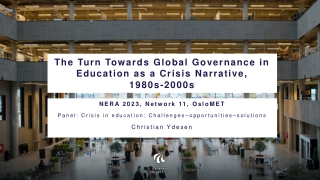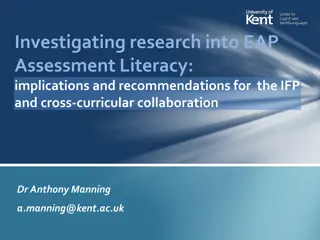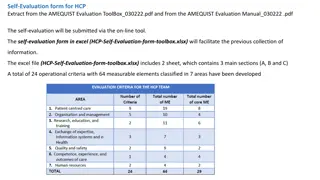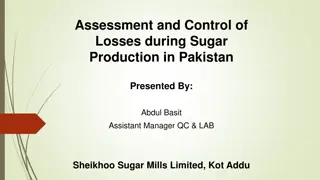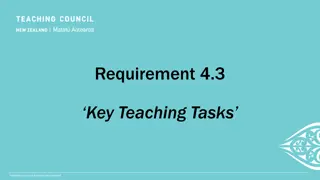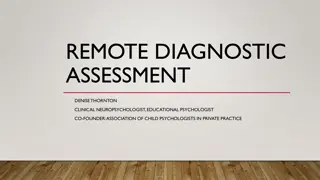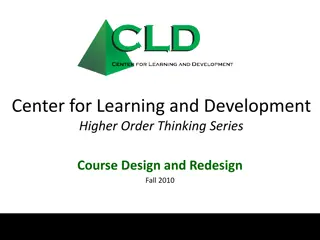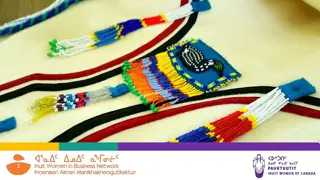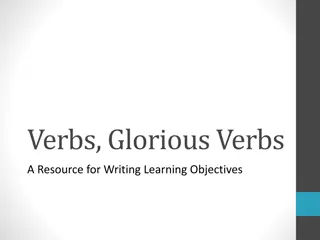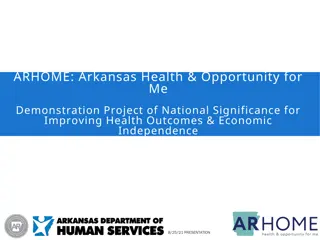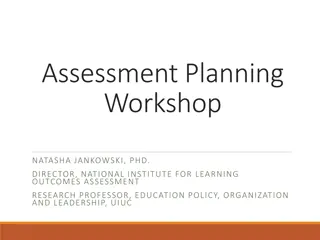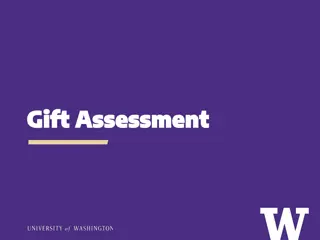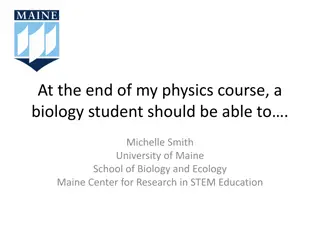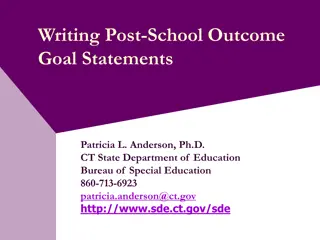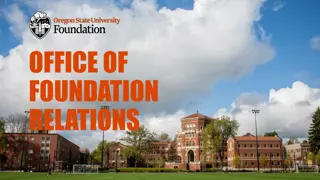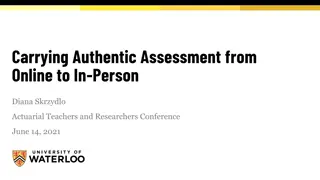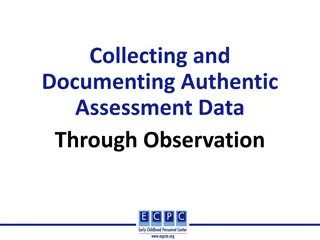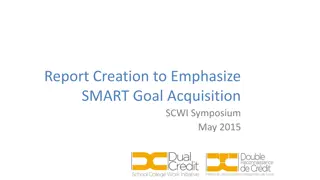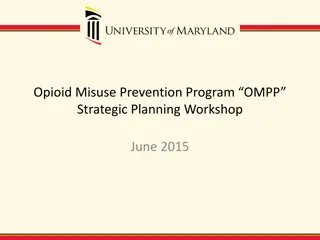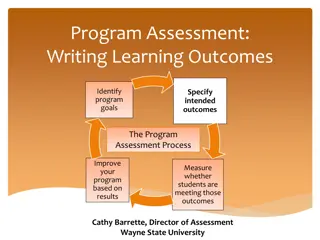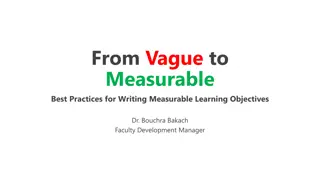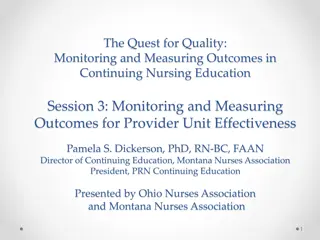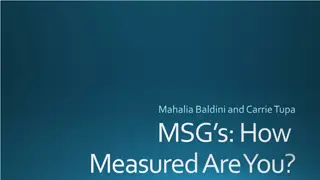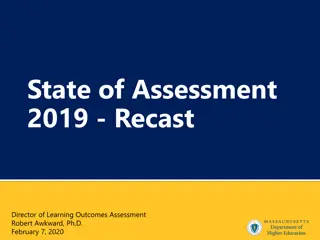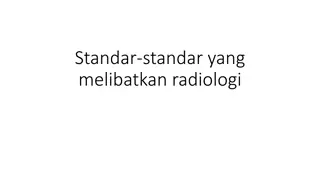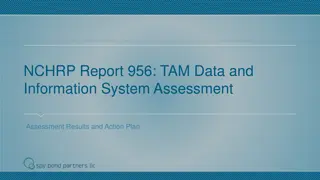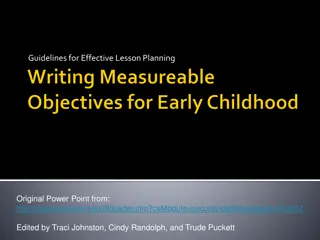Global Governance in Education Crisis Narrative
Explore the shift towards global governance in education, focusing on the impact of global learning metrics. The narrative delves into how initiatives like SDG 4 shape education assessment, highlighting challenges like the narrowing of educational agendas and the devaluing of non-measurable learning
2 views • 13 slides
Sheffield Early Help Assessment Form Update and Integration with Extended Support Plan
Sheffield has introduced an updated Early Help Assessment form to streamline the assessment process within the Early Help System. This new form combines the Early Help Assessment with the Extended Support Plan, aligning various assessment tools and referral forms into one comprehensive document. The
5 views • 22 slides
Enhancing Language Learning Through Peer Assessment
Explore the benefits of peer assessment as a valuable tool for language learning, comparing it with self-assessment. Discover the components and challenges of self-assessment, along with the potential of peer assessment to improve accuracy and promote self-regulation. Gain insights into what peer as
3 views • 29 slides
Investigating EAP Assessment Literacy for IFP and Cross-Curricular Collaboration
This research project by Dr. Anthony Manning explores the implications and recommendations regarding EAP assessment literacy for the International Foundation Program (IFP) and cross-curricular collaboration. The study delves into defining assessment literacy, research objectives, relevant literature
3 views • 26 slides
Overview of DSW End Point Assessment Team Leader Level 3
DSW End Point Assessment Team Leader Level 3 provides a clear understanding of the assessment process, ensuring individuals comprehend why and when it occurs, responsibilities involved, and how DSW supports them. It covers topics such as what End Point Assessment entails, assessment design and deliv
1 views • 18 slides
Comprehensive Self-Evaluation Form for HCP - A Tool for Measurable Assessment
This self-evaluation tool for Healthcare Providers (HCP) facilitates a comprehensive assessment based on 24 operational criteria with 64 measurable elements. It includes sections for team identification, expertise, services provided, barriers encountered, scoring options with guidelines, and evidenc
0 views • 6 slides
Assessment and Control of Sugar Production Losses in Pakistan
Maximizing sucrose recovery in sugar production is crucial for optimizing operational efficiency and profitability. This study focuses on identifying and managing operational losses within the sugar production process in Pakistan, categorizing losses as determined (easily measurable) and undetermine
2 views • 16 slides
Key Teaching Tasks and Partnerships in Assessment Framework
The assessment framework for teacher training programs must include a set of 10-15 key teaching tasks that new teachers should be capable of performing on their first day on the job. These tasks need to align with teaching standards, be observable and measurable, and connect directly to working with
1 views • 13 slides
Remote Diagnostic Assessment Explained by Clinical Neuropsychologist
Remote diagnostic assessment, also known as telepractice, allows assessors and individuals to be in separate locations while using internet-connected devices for assessment sessions. A facilitator may be present for support, and precautions are taken to ensure confidentiality and integrity of the as
3 views • 13 slides
Higher Order Thinking Series Course Design and Redesign - Fall 2010
Essential course elements like course description, student learning outcomes, assessment methods, and more are discussed in this Higher Order Thinking Series Course Design and Redesign session. The course aims to provide a foundation in human physiology for future professional studies, with specific
2 views • 26 slides
Mastering the Art of Goal Setting for Sustainable Success
Effectively developing good goals is essential for maintaining a consistent pace towards success. By ensuring goals are SMART (Specific, Measurable, Accountable, Realistic, Timetabled), individuals can enhance their focus, motivation, and progress tracking. Specific goals help in clarifying objectiv
2 views • 10 slides
Crafting Effective Learning Objectives Using Action Verbs
Crafting measurable learning outcomes involves focusing on student behaviors, using specific action verbs, selecting appropriate assessment methods, and setting clear performance criteria. The checklist provided emphasizes the importance of observable and measurable outcomes, incorporating active ve
7 views • 27 slides
Understanding Assessment in Medical Education
Exploring the concepts of assessment in medical education, including defining assessment, types of assessment, reliability, validity, and aligning assessment methods with intended learning outcomes. The importance of constructive alignment and the impact of assessment on learning outcomes are also d
1 views • 12 slides
Assessment Matters in Sociology: Enhancing Learning Through Evaluation
Explore the significance of assessment in sociology education, focusing on key questions to evaluate current assessment procedures, review individual course assessments, and develop strategies to enhance student learning outcomes. Delve into the centrality of assessment in the learning process, with
1 views • 15 slides
ARHOME: Arkansas Health & Opportunity for Me Demonstration Project
The ARHOME project in Arkansas aims to improve health outcomes and economic independence by transitioning Medicaid recipients to private insurance while maintaining eligibility and federal funding. With measurable goals focused on health improvement and poverty reduction, ARHOME seeks to drive quali
0 views • 16 slides
Insights into Managing Assessment in the Classroom by Assessment Research Group
Explore the importance of standards and assessment in education through the lens of the Assessment Research Group. Gain valuable perspectives on curriculum delivery, understanding the assessment system, learner assumptions, task parameters, and more. Discover how language, structure, and agency play
2 views • 25 slides
Workshop on Assessment Planning by Dr. Natasha Jankowski
Dr. Natasha Jankowski, Director of the National Institute for Learning Outcomes Assessment, conducts a workshop focusing on effective use of assessment data to enhance undergraduate education. The workshop covers areas like evaluating assessment plans, program learning outcomes, and assessment rubri
0 views • 30 slides
Enhancing Understanding through Assessment in Educational Design Workshop
Learn and collaborate on assessment practices in education design at the "Understanding by Design Assessment Focus" workshop. The agenda includes sessions on summative and formative assessment, feedback, reporting, and more. Engage in activities like generating questions, finding destination partner
1 views • 76 slides
Institutional Assessment Planning Workshop Feedback and Insights
Feedback and insights from a recent institutional assessment planning workshop led by Dr. Mark Nicholas at FSU S. Warren Conference Center & Inn. Participants provided feedback on the usefulness of the content, presenter knowledge, ability to develop assessment plans, post-training assessment knowle
1 views • 9 slides
Understanding Higher Education Assessment: The Complete Guide
Higher education assessment involves a systematic process of collecting, reviewing, and utilizing information to improve student learning and development. This guide covers the assessment cycle, learning outcomes, the mission behind assessment in higher education, what assessment is and is not, reas
1 views • 36 slides
Understanding Gift Assessment Process at University of Washington
The Gift Assessment Process at University of Washington involves applying a 5% assessment to select current-use gifts over $1,000 and under $5 million. This assessment supports the university's advancement efforts and institutional priorities by transferring 5% of eligible contributions to the Provo
1 views • 5 slides
Overview of Environmental Impact Assessment and Strategic Environmental Assessment Directives
Environmental Impact Assessment (EIA) and Strategic Environmental Assessment (SEA) play crucial roles in evaluating the impact of planned activities on the environment. This content delves into the concept, origins, development, and key elements of environmental assessment, discussing the legal fram
2 views • 35 slides
Institutional Assessment and Effectiveness Workshop Achievements at SUNY Oneonta
The Office of Institutional Assessment and Effectiveness at SUNY Oneonta has made significant progress in developing assessment protocols and processes, leading to a culture of assessment. This includes completing planning and assessment cycles, establishing objectives and procedures, and aligning u
1 views • 16 slides
Understanding Learning Goals in Physics for Life Sciences
Exploring the importance of learning goals in physics education for life sciences, this content emphasizes the need for measurable objectives that drive assessment and instruction. It touches on defining learning goals, distinguishing them from syllabi, and provides examples of how to structure clea
0 views • 17 slides
Understanding Post-School Outcome Goal Statements in Education
Secondary transition involves a coordinated set of activities to facilitate academic and functional achievement, preparing students for post-school activities like postsecondary education, employment, or independent living. Transition services must begin by age 16 and include measurable postsecondar
0 views • 27 slides
Understanding Logic Models and Evaluation Metrics for Successful Grant Proposals
This content provides insights into logic models, evaluation metrics, and the importance of measurable outcomes in grant proposals. It emphasizes the significance of clear evaluation plans to showcase project impact and meet sponsor expectations. The material also includes examples of measurable vs.
0 views • 19 slides
Oregon Department of Education Assessment and Accountability Resources
Access important information on assessments, accountability, and reporting from the Oregon Department of Education. Find resources on updating assessment records, accessing student scores, and staying informed about assessment requirements for the 2023-24 academic year. Explore links for assessment
0 views • 55 slides
Oregon Department of Education - Assessment Resources and Updates
Explore the Assessment Record Updating Application (ARUA), Accountability Warehouse Extract (AWE), Secure Assessment Reports, and other important tools and information provided by the Oregon Department of Education for assessment data owners, analysts, and partners. Access links for assessment admin
0 views • 54 slides
Enhancing Teaching Assessment for Actuarial Education
Exploring the transition of assessment practices from online to in-person settings, this presentation by Diana Skrzydlo at the Actuarial Teachers and Researchers Conference delves into the purpose of assessment, key principles, and activities for effective evaluation. Discover insights on diagnostic
0 views • 10 slides
Authentic Assessment through Systematic Observation: Best Practices
Explore the process of authentic assessment through systematic observation in early childhood education. Learn about collecting, documenting, and interpreting assessment data using evidence-based practices and technology. Discover the importance of working collaboratively with families and professio
0 views • 53 slides
Maximizing Goal Achievement through SMART Goals
Enhance goal-setting practices for optimal student and program outcomes by following SMART criteria: Specific, Measurable, Attainable, Results-Oriented, and Time-bound. Learn how to create impactful goals, set ambitious yet achievable targets, and ensure regular review and assessment for success.
0 views • 34 slides
Strategic Planning Workshop for Opioid Misuse Prevention
Learn about the strategic planning process for addressing opioid misuse through evidence-based prevention strategies. Discover how to develop a detailed plan with measurable outcomes, involving the entire coalition in selecting impactful strategies. Move from needs assessment to action by identifyin
0 views • 33 slides
Enhancing Program Assessment through Learning Outcomes
Learning outcomes are specific, measurable statements that define what graduating students should know, be able to do, believe, or value. Explicitly stating learning outcomes helps in expressing program benefits clearly to stakeholders, attracting students, and securing donations and resources effec
0 views • 15 slides
Effective Strategies for Writing Measurable Learning Objectives
Learn best practices for transforming vague course outcomes into measurable learning objectives. Dr. Bouchra Bakach provides insights on overcoming challenges in aligning course outcomes with assessments, engaging students in understanding learning objectives, and establishing clear connections to f
0 views • 37 slides
Monitoring and Measuring Outcomes in Continuing Nursing Education Session
This session presented by Pamela S. Dickerson focuses on developing processes for measurable outcomes in patient care and professional development of registered nurses through effective monitoring and measurement strategies. Topics include data collection, data analysis, and provider unit effectiven
0 views • 55 slides
Review of Measurable Skill Gains in Education Programs
This content provides a detailed review of Measurable Skill Gains (MSGs) in education programs, covering aspects such as skill gains, high school equivalency achievement, postsecondary progression, and workforce training. It also clarifies criteria for basic education gains under WIOA and discusses
0 views • 19 slides
Assessment Practices in Higher Education Institutions
Dive into the state of assessment for the year 2019, featuring insights on hosting assessment days, establishment of assessment committees, implementation of institutional and program learning outcomes, appointment of a Director of Assessment, compensation for faculty members focusing on assessment,
0 views • 8 slides
Radiology Standards and Measurable Elements in Healthcare Settings
Radiology standards involve identifying patients correctly, reporting critical results, and ensuring quality control. Measurable elements include meeting local and national regulations, providing convenient services, and involving qualified staff in diagnostic imaging. Responsibilities also cover li
0 views • 22 slides
NCHRP Report 956 TAM Data and Information System Assessment
This content provides an overview of NCHRP Report 956 focusing on the TAM data and information system assessment results and action plan. It includes details on assessment outcomes, recommendations, implementation action plans, and tools for self-assessment and improvement methodology. The content a
0 views • 21 slides
Effective Lesson Planning Guidelines
Explore the key principles for effective lesson planning, starting with understanding the Infant Toddler Frameworks and progressing to choosing relevant benchmarks and writing measurable objectives. Learn how measurable objectives guide instructional activities and materials selection, focusing on s
0 views • 26 slides
